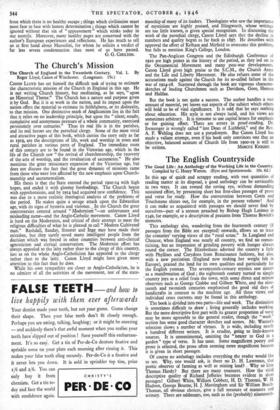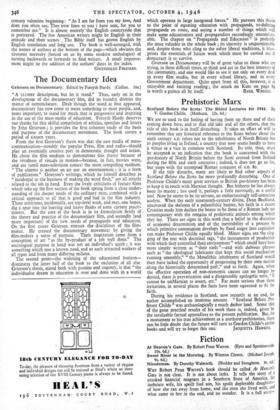The English Countryside
The Good Life : An Anthology of the Working Life in the Country. Compiled by C. Henry Warren. (Eyre and Spottiswoode. 10s. 6d.) IN this age of quick and scrappy reading, with vast quantities of reading matter at its disposal, a good anthology can be serviceable in two ways. It can reward the roving eye, without demanding sustained effort, by presenting short but first-class passages of prose and verse for study. How the conversation between Corin and Touchstone shines out, for example, in the present volume! And it can make us acquainted with passages we should never find by ourselves—pan of a sermon preached by Bishop Hugh Latimer in 1549, for example, or a description of peasants from Thomas Bewick's memoirs.
This anthology also, wandering from the fourteenth century (if passages from the Bible are excepted) onwards, allows us to trace the centuries' varying views of the " rural scene." In Langland and Chaucer, when England was nearly all country, we find no roman- ticising, but an impression of grinding poverty with hunger always round the corner. The Elizabethans adorned the country a little with Phyllises and Corydons from Renaissance fashions, but also, with a new patriotism (England now making her weight felt in Europe), praised the land for its own qualities and particularly for the English yeoman. The seventeenth-century mystics saw nature as a manifestation of God ; the eighteenth century turned to simple country joys as a relief from the town, with some direct and minute observers such as George Crabbe and Gilbert White, and the nine- teenth and twentieth centuries emphasised the good old days of handicrafts in contrast to the machine age. All these views and individual cross currents may be found in this anthology.
The book is diVided into two parts—life and work. The distinction is. sometimes difficult to draw ; living generally includes working. But the more descriptive first part with its greater proportion of verse may be more agreeable to the general reader, though the " work " section has some good character sketches and scenes. Mr. Warren's selection shows a number of virtues. It is wide, including nearly a hundred different writers. It is erudite, going to little-known sources. It is unsentimental, omitting the "nearer to God in a garden " type of verse. It has taste. Some magnificent poetry and prose is selected, the prose often seeming more magnificent because it is given in short passages.
Of course no anthology includes everything the reader would like to see. Why, one would ask, is there no D. H. Lawrence, that poetic observer of farming as well as mining land? Why so little Thomas Hardy? But there are many treasures. How the vivid descriptive quality of Richard Jefferies becomes evident in short passages! Gilbert White, William Cobbett, H. D. Thoreau, W. 11. Hudson, George Bourne, H. J. Massingham and Sir William Beach- Thomas, all obvious choices, give a full measure of manners and scenery. There are oddments, too, such as the (probably) nineteenth-
century valentine beginning : " As I am far from you my love, And dont you often see, Thes crew lines to you i have sent, for you to remember me." It is almost entirely'the English countryside that is portrayed. The few American writers might be English in their attitude and their scenes. The Bible itself has grown English by English translation and long use. The book is well-arranged, with the names of authors at the bottom of the page—which obviates the tiresome necessity (forced on us by some modern anthologies) of turning backwards or forwards to find writers. A small improve- ment might be the addition of the authors' dates in the index.
GWENDOLEN FREEMAN.































 Previous page
Previous page